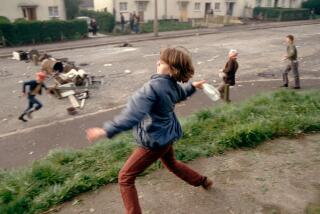English identity, tangled
- Share via
The question of what it means to be English is endlessly fascinating. There doesn’t seem to be a national identity that’s more fun to puzzle over. “Englishness” is a quality tangled up in the remnants of a foreign empire (chicken tikka masala is arguably the national dish) and, more recently, in questions of immigration. It’s as if the English, as a people, can’t exist without a good dose of stuff that isn’t English.
Helen Walsh’s soulful new novel, “Once Upon a Time in England,” takes up this debate. After a racial attack on his Malaysian wife, working-class singer Robbie Fitzgerald pushes aside his one chance at a recording contract to stay home in Warrington and comfort the hysterical Susheela. She has never told him that she was once raped, even though her neuroses pile up, leaving the illiterate Robbie the only breadwinner while the educated wife shivers helplessly at home.
None of the characters is canonically English. Flame-haired Robbie is of Irish descent. Susheela, later known as Sheila, immigrated from Kuala Lumpur to work as a nurse; their children, Vincent and Ellie, are a mixture of ethnicities. Even the songs Robbie sings are American -- yet they’re an English family living in England.
Fans of “Brass,” Walsh’s punky chick-lit first novel, will notice a sea change in her style. The very English Walsh seems to have become deeply influenced by Indian writers and gives us descriptions of life in council estates (housing projects) and English suburbia. With such a bleak external world, Walsh’s mental landscapes replace physical ones, illuminating Sheila’s death of self with extraordinary clarity: “the Ganesha statue, her tongue cleaners, her incense sticks -- she kept hidden away. . . .” The irony is that the Indian writers Walsh has read so well were themselves deeply inspired by E.M. Forster, that literary sharpshooter whose favored quarry was English class division. Yet Walsh’s striving-to-be-middle-class Fitzgeralds accept the notion of class divisions as gospel. Her intercultural mash-up is kinda nifty yet feels totally normal.
When the book enters the world of Vincent and Ellie, the writing achieves a sparkling grace. Vincent prowls the streets of Warrington as a brilliant young writer, disdaining the girls and boys who once tormented him as a half-breed mongrel. Ellie attends raves, supporting her E habit as one of the scene’s cleverer pickpockets, and she also attends a posh school on scholarship.
The siblings and their non-middle-class, arguably non-English colleagues have more energy and are somehow more English than the tired-out upper-middle-class girls of Ellie’s fancy school or the lower-class, racist white boys who stalk local “Pakis” and “queers.” “So this is the public face of the great white menace. Fourteen-year-old ferrets in shell suits with hideous acne,” Vincent muses to himself. “Somehow the Aryan ideal has been lost in translation.” For a few brief, shining moments, it seems as though the white children of English-born parents aren’t particularly English at all. The immigrant kids are taking over the culture, doing a better job at being alive than the “bitter, watchful minority.”
So is Englishness sustained by folk of English birth or by newcomers? Walsh fails to answer the question. (Is there an answer?) This makes the book end oddly, but this is probably a better choice than pretending to know or ignoring the problem.
That said, “Once Upon a Time in England” is a wonderful book. Sheila’s arc from basket-case helplessness to new self-sufficiency is lovely to behold. Robbie is the wild, adoring lover whom all women think they want, yet Walsh shows him as a man first broken by love, then broken by circumstance -- until, divorced, working as an Elvis impersonator, he becomes the archetype of a globally lost soul. The phantom of American fame that haunts Robbie, Walsh shows, is a goal over which all good men break themselves, even in England.
Walsh’s story ends with the death of its most improbable -- and most moving -- character. It’s as if this harsh cultural stew cannot, in the end, sustain a sensitive mind. Although the story has a deep, upsetting beauty, a reason to read “Once Upon a Time in England” is because its tension is the world’s tension. It’s not so much a mirror -- mirrors are clear -- as it is a distressingly familiar tangle of identity.
--
Laurel Maury is a New York-based writer and critic.
More to Read
Sign up for our Book Club newsletter
Get the latest news, events and more from the Los Angeles Times Book Club, and help us get L.A. reading and talking.
You may occasionally receive promotional content from the Los Angeles Times.









